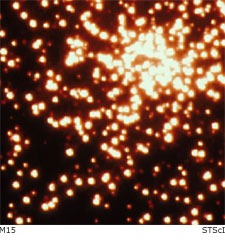|
My bias in this course? I regard AST 352K as a vital link between the basic, often elegant
physics and mathematics that you have ingested at UT for the past two-three
years, and the real, often messy world of astronomical research.
Astrophysics combines elements from all areas of physics to offer
coherent theoretical models for how the solar system, galaxy, and universe
are constructed and how they have and will evolve.
If you are looking for that in this course, forget it.
Theoretical astrophysics cannot really derive rational models for an
object without appealing to observational astronomy.
I am not an astrophysicist as the term is usually meant (that is,
I am not a theorist).
I am an observational astronomer, and proud of it.
And observational astronomy is what you will find covered in this course.
Not how is the universe constructed, but how does one practically
assemble the basic data about particular astronomical objects (stars)
that can be gainfully used in constructing the story of the universe?
 So forget cookbook problems? Not entirely, but we will deal as much as possible with real data from the
literature that have been obtained at various astronomical facilities
over the past decades, and which now are readily available for study.
Many of the homework problems will encourage you to seek data from
basic astronomical catalogs.
These sources can be found on web sites and in our Peridier Library,
to which we intend to introduce you if you have not already seen it.
However, a serious word needs to be given here.
The Peridier Library is NOT part of the general UT library system,
but is instead a part of the department and observatory research facility.
It is available to help you by providing materials for this course.
It is intended solely for the use of our faculty, staff, and research
students.
We invite you to begin integrating into our program with privileges
to the Peridier Library.
Please use this library moderately, quietly and with respect for others.
Think of your use of the Peridier Library as a guest membership
at a club, and please do not abuse it or overstay your welcome.
So forget cookbook problems? Not entirely, but we will deal as much as possible with real data from the
literature that have been obtained at various astronomical facilities
over the past decades, and which now are readily available for study.
Many of the homework problems will encourage you to seek data from
basic astronomical catalogs.
These sources can be found on web sites and in our Peridier Library,
to which we intend to introduce you if you have not already seen it.
However, a serious word needs to be given here.
The Peridier Library is NOT part of the general UT library system,
but is instead a part of the department and observatory research facility.
It is available to help you by providing materials for this course.
It is intended solely for the use of our faculty, staff, and research
students.
We invite you to begin integrating into our program with privileges
to the Peridier Library.
Please use this library moderately, quietly and with respect for others.
Think of your use of the Peridier Library as a guest membership
at a club, and please do not abuse it or overstay your welcome.
Homework, and your approach to it? The homework sets are the keys to what I want to get done in this course.
I intend to be (perhaps irritatingly) vague in some of the assignments.
I admit this to be a totally deliberate ploy.
Real astronomical research usually does not admit cookbook
solutions to interesting problems, and I want you to get used to that.
Such an approach is also a signal on my part that I encourage interactions
with you outside class.
Feel free to discuss with me the course material, problem sets, or any
other astronomical topic that come to mind.
On the first page I give the formal office hours, but you of course
may set up appointments with me at other rational times of day.
Notice also that I give my work number, email address, and my home
phone number.
I prefer contact in person or a phone call; emails to me can get deeply
buried.
I would not give out my home phone number if I did not expect calls
in the evening whenever you need to.
(OK, it's true that we are the
only Snedens in the Austin telephone directory.)
I want to help you do well in this course, but I need you to make
contact!
Don't be shy: remember that the truly stupid question is the unasked one.
|

